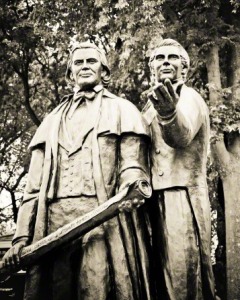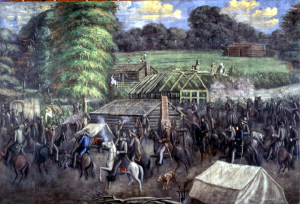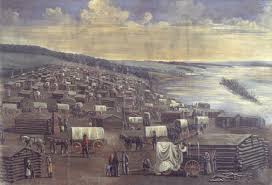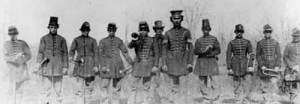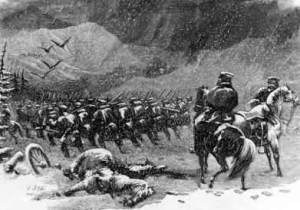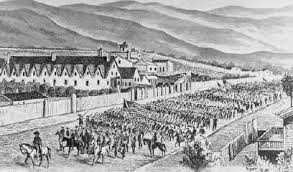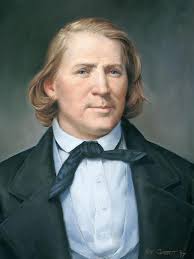This draft of an autobiographical sketch, undated, recounts stories of Zerah’s ancestors as well as his conversion to and early experiences with the Latter Day Saint movement in New York and Kirtland. It covers similar events to the ones in his more famous autobiography but in different ways, sometimes going into greater depth. His statement that twenty years had passed since his conversion dates this autobiographical sketch to the early 1850s. Unfortunately, only about eight pages, plus two inserts on smaller paper are housed in the Church History Library in Salt Lake City, though it appears that the original document would have been longer, as it stops in the middle of a narrative.
Typescript prepared by Chad L. Nielsen, July 2014. Spelling, punctuation and paragraphs retained as presented in the original. See “Zerah Pulsipher autobiographical sketch,” undated. MS 753.3. Church History Library of the Church of Jesus Christ of Latter-day Saints, Salt Lake City, Utah.
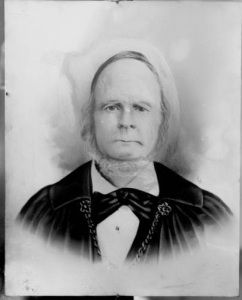
*******
Page 1
I was <born> June 24th AD 1789 the names of my Parents were John and Elizabeth Pulsipher My Grandfather Pulsipher removed from C.t. in New england in the year 1769 but the season Previous to that he came to Vt. To a Town afterwards <Cald> Rockingham near Bellows falls on Conneticut River an entire new country five miles west of the falls before a blow was struck by a white inhabitant he saught a Location and Predicted where the site for Town business would be done and where the Meting house and bureing [burying] ground would be he there selected five hundred Acres of Land which to this day remains to be the inheritance of many of his posterity the Meting house Bureing [burying] ground and site of Town business has taken place to the Letter According to his prediction Eighty four year before[.] My Great Grandfather is supposd to be a decendant from Ireland and as observed above my he Grandsire establisd a settlement and Converted the Wildern[ess] into a fruitful field Establishd a Large Publick hous wich remaind for many years[.] when <the> revelution commend [commenced] in the spring of =75 my father being [page torn] years of of age one day being absent from <home> heard [torn] Distruction of the Military stores at Concord N H and Battle of Lexington saught for a recruting officer and enlisted for before he returnd home and informd his father what he had done the old man being about fifty years old after deliberating upon it and being aquainted with the usages of war on account of his experience in the french war sd [said] to him John you ar[torn] [aren’t old] Enough to go alone I will go with you accordingly he [torn] [did, and they both] went together[.] in June following the Battle of Bun[torn] [Bunker Hill was] faught they stood and faught side and side [torn] time after the orders were given for retr[torn] [retreat, and] hearing it my father Looking round an[torn] [and seeing them] selves nearly surrounded sd father Look [torn] Gentleman turning round and sd tis to [torn] [p.[2]] there was but a small gap then Left that was not surrounded by the Enemy and the ground in <that> was continualy with the plowing with Balls from the Britis shiping but as they were going out my grand father saw an american soldier wounded Crawling away upon his hands & knees and a brittish soldier coming up piercd his Body with a bayonet my grandsire being fird with indignation at such ingratitude so contrary to the usuages of war s<t>opd amid all the dangers and Perrils which he was there surrounded and deliberately Sounded his gun and shot him down before he left the ground and then obtaind a safe retreat I merely mention these things that my posterity may under stand that their ancesters had the Blood of Liberty and Judgement deliberately exercisd in times of the most Emenent danger for the avenging of the Blood of the Inocent and putting <down> [torn] oppression but as I observd my grandsire procurd a [torn] [sa]fe retreat and remaind for some months till taken with [torn] cramp Rheumatism in the Breast and died but my [torn] [fat]her servd the campaign out and then returnd home to his friends[. He] soon married and raisd seven sons and three daughters was always a firm promoter of the rights of the Constitution of the united states with an energetick for Liberty and Equal rights of man he was remarkably persevering in the things he engaged in but all with the most candid deliberation[.] his government was absolute in his family[,] kind and friendly to his Neighbors and especially to <the> p[torn] [poor at lea]st once a year he would go to some expense to make a f[torn] [feast and in]vite the poorest People there was in the Town and [torn] [received] them with the greatest pleasure I always had great [torn] my father altho he was remarkably persevering [torn]ily authority I was allways taught to read the Bible [torn] [and to observe] the sabbath I recollect one circumstance when I w[torn] Probably not more than nine or ten years old [torn] [my father] was taken sick and remained dangerous [p.3] & for some months altho I was not appraisd of it one <one> day there were a number of the neighbors in I heard them saying among them selves that Mr. Pulsipher must die It struck me with astonishment I wondered if my father must die then and leave a large family of <children> to the open world without a guide I <thought> upon the dangerous circumstances we should be in and I was very unwilling to have it so affter a little reflection a thought come into my mind that I must go immediately to the barn and pray for him to get well altho I had never prayed in my life except being taught to say the Lords praye<r> but I did not hesitate one moment but ran as fast as me Legs Could carry me and when I got to the place was about to kneel down somthing whispered in my ear that if I did I should die in that place and should never rise again I was so supprised that I ran back as fast as I came
from that I had many reflections relative to thing seen and unseen I became Considerably acquainted <with the Bible> and generally knew when [torn] it repeated correct[.] as for the Doctrene of Eternal punishm[torn] [punishment] I did not comprehend as the sects taught it to me at [torn]♢pe♢ Consistent to me with the attributes of god as it seem[torn] many thing that were taught by the <sects> after careful investigation I laid them aside for further consideration and desird more Light I often thought upon the Blesed privilege the saints had in [torn] [p.5] and the glory of the Millenium when Light and truth would fill the Earth. At length the time came when god should bring to pass the things spoken by the Prophets Acordingly in the summer of 1830 I heard a Minister say in Public that a golden Bible or some ancient Records were found in Manches<ter> N.Y.[1] the sentence thrild through my sistem Like a shock of Electricity I therefore watchd the movement of things and in septbr 1831 the Book of Mormon was brought into the Town I suceeded in Borrowing it I read it through three times and thought Posible it might be true in Janry following Jared Carter came to town my<self in company> with two other Preachers went to hear him preach. I watchd him remarkable Close and found he sd nothing that would conflict with scripture he would frequently take up the book of Mormon and declare it a Revelation from heaven it had a very strong impression on my mind But I did not know it to be so myself I therefore arose before the Congregation and said we had been <hearing> strange things and if true was to us of the utmost importance and if not so it must be a great delusion And in as much as it purports to be a revelation from heaven I believed that I Could learn from the same source whether it was or not [water damage] I gave them my determination that I would engage with all the energy [torn] <my> Soul till I <knew> whether it was from god or not I therefore cont[torn] [continued] praying mightily to god for a number of days. At length one [torn] [day] as I was threshing in my barn with the doors all Closd a ray of Light fild my mind remarkably upon the Principles of the Gospel I nearly believd that what I had heard was true but it soon left me to ponder upon it I assumd my labor again but of short duration. Another bright<er> light presented from above with such masterly rays of Glory filld me to the running over it came with such magestty and power from above that I lookd up to see from whence it came and beheld as I thought the Angels of god with the Book of Mormon in their hands informing me that was the great work of god that was to Commence in the Last days to fulfil all the all the Prophecies that had been spoken on on that subject. I At length felt such inexpresible Joy and gratitude to my heavenly <father> that he had Brought forth the preparation for that great glory in the day in which I Lived that I walk<d> through my barn <crying> glory Hallalujah to god and the lamb forever and ever And I will observed <here> that about twenty years have pasd away since that time [p.[6]] and I <had> been through nearly all the wars and Persecution that the People calld Latter day saints have past through and have not yet found any thing to shake my faith. But to return to <my> Record in the winter of =32, after receiving such a display of the mercy of of god [I] Informd Br Carter that I believed in the Gospel that he Preached he answered if I believed I should be baptised[.] I informd him that I was not ready that I was connected with a Large Church of very kind and friendly Breathren and that I wishd to see them together and inform them of my calculation
Accordingly I cald a meting and when they came together they wishd to know the business of the same I informd <them> that I wishd to withdraw form [from] the Churc<h> they wanted to know my reasons I informd them that I had <found that> gospel that I had been wanting for many years and was now prepared to engage in it with many other remarks which I made to them they wished to know if I would still Preach with <them> after I should with draw I informd <them> I would as much as I Could but wishd <that I could> spread it all over the Earth and I thought that many would believe it they finally gave me a very handsome Letter of Commendation and I withdrew I then went home informd my family and neighbors of my resolution and my [torn] and only Child that was old enough to be Baptisd with three of my Neighbors [torn] the Ordinance as a Church of Latter day saints Br Carter wishd to ordain [torn] Elder but I at first refusd but after he had Baptized 19 there Came up a [torn]tion [situation] and he sd he must Leave and if I would not be ordained he must Leave [torn] were but there being no church that I knew of nearer <then> two hundred miles I Consented and Continued in that place to Preach also in the regions around from thirty to one hundred miles with some success Baptizen [baptizing] in many in that place annd some in allmost every place wher I preachd with signs folloing them that believd in the spring O Heid [Orson Hyde] and S[amuel] Smith came throu<gh> that Country to my great Joy and satisfaction as I was much in need of instruction they preachd a number of times Baptized some <gave me Presidency of the Branch> and went on to the East[2] But as I had for some years Previous to this been acquainted with <many> of People in various parts of the Country there Preachers of Baptist Methodist Reformers Presbyterian <and> Quakers came to try to get me out of the delusion[.] some of them would go away <in a rage> others gave <me> up for Lost while some believed Me and were baptized Among the rest was a Methodist Preacher thought by many to be of considerable importance Came to me saying he was sick and wishd to be heald I saw the Spirit he was of and asked him if he believed that the Methodist were [p.7] of the body or Church of Christ he answerd in the affirmative I then asked him why he had Left <the body & Church of Christ> them and come to an imposter to be heald [illegible] was not troubled with his Company any Longer than while he Could make reasons and return but I understood the poor man could not Preach at his Next appointment. In the fall =32 there was some division in the Church in Consequence of teaching from an Elder that went through there which Teaching I rejected. (the Teaching was that women should have the gift of seeing that they Might be able to discover the Mistakes that the Elders might make from time to time and furthermore that they might actually see what was in <their> hearts and if <they> had <any> hypocrisy to declare it before the Church to <this> Calling I understood he ordaind a number of the sisters who made use of this power to the condemning of some a Justifying others without any other testimony) This causd me a Journey to Kirtland Ohio 325 miles in <the> month Decbr to get a council of high Priests that would be able to try the spirits to the satisfaction of all the honest in heart I went to Kirtland as quick as I could traveled in the mud by day and rode in the stage at night arrived at that place the Last of Decbr. they immediately Calld a Conference and sent R[eynolds] Cahoon and D[avid] Patten who came with Leonard Rich and set things in order. in March following I removed to Courtland Co [Cortland County, New York] preachd some and Lab[torn] [labored] to support my family in March =35 removed to shenang Co. [Chenango County, New York] Preachd s[torn] numerous parts of the Country in May =3♢ Took a company and removd [torn] Ohio there Labored to support my family and build the Temple which was fin[torn] the next winter Dedicated and I received my first Endowment in the Temple with about 300 others we also attended many feasts that winter of Bread and wine In the fall of =37 I went on a mission to Canada Broke new ground Baptized 29 Members returnd home in the winter <and was ordaind a president of the seventy> of =38 that winter a heavey steam of persecution arose the first Presidency fled for their lives and went to Missouri with Many to Missouri (The winter Previous to I was ordaind to the first Council of the Seventies) Most of the Church that <could> to get away went of that winter which a large number of the Poor Class <were left> behind there were a number of the seventy that Continued to Meet together and at one time when twenty or thirty of us were together we agreed to Put our Property togethe[r] and all fare alik[e] and move to Missouri helping each other with all we had till we got through and on this agreement felt a great degree of the <Spirit> of god other heard of it and flockd to our Meting desiring to be received into the Company they Continualy kept [p.8] coming and among them the poost [poorest] of the poor that had not even Clothing to their Backs suficient to leave home. But we soon found that we had got a Job on hand that was not so easily got along with becaus those poor were in as good felloship with the Church as those that had gone <and> probably got through. There were seven of us who were engaged as council of that Camp Viz. Joseph Young, Henry Heriman [Harriman], Z[erah] Pulsipher, Josiah Butterfield, James Foster, Elias Smith, & Benjamin Wilber.[3] This seven set themselves at work to remove the Poor from Kirtland to Missouri in time of the Kirtland persecution in =37 and =38 without means ourselves or knowing Where it should come from there were at this time about six hundred that were of this <sort> to remove near one thousa<nd> <miles> and feeling ourselves in inadequate with<out> the assistance of some higher power that should interfere we therefore saught the Lord in Prayer in the Atick story of the Lords house from two to three times per week that the way might open for means to affect the purpose. At length at one time when we assembled in prayer a Bright Looking Mesenger stood before me drest in a white robe stood Before me while we were engaged in Prayer he was an old man but very tall and strait with long grey hair that hung over his shoulders [torn]th curld at the end with a grave penetrating countanance with grey eyes [torn]d his eyes from me to the other breathren and then to me again [torn]t leaning his head and then spoke and said be one and you shall [torn] [have] Enough this gave us great satisfaction to find that the Heavenly mesengers were interested on our behalf a short time from this a man sent word to us that he would Lend us $300 Dollars and donate fifty more on our mission we therefore obtaind all we could in addition to this and sent to Buffaloe and Bought Cloths at wholesale and Clothd the Peopple alittle better A little circumstance which took place about that <time> I will now relate the Mob <were> very hostile all the time while we were preparing for three months our constant practice was to meet in the Temple for prayer one evening after we had retired home Late some persons set fire to a Methodist Meeting house which stood near our temple and burnt it down allso threw a brand of fire attacht to straw in to the temple window but this went out[.] the next day the cry was made that the Council had burnd the Meeting house this was done for a pretext to destroy us but we paid no attention to it but steadily pursued our way at length one of the ring leaders of the Mob had a Vision and saw [document ends here, but two small additions on smaller paper were attached]
1st Addition
1•Page
Here, I had many Controversies with sectarian Priests in as much as I did believe in there manner of Preaching and Punishme<nt> Pronouncd on the People that did receive their faith and they accordingly Pronouncd on me Tracts of Infidelity which were some of the Principles of the Fulness of the Gospel which we now Practice and Believe
2nd Addition
As soon as I saw the Preacher[4] again I informd him that I knew the work to be of god and that the Book of Mormon was True he then [said] if you believe then be Baptized I sd I was not quite Reaedy as I Belongd to a Large Church and wishd to see them together & withdraw in a proper manner I Cald a Church Meting they wishd to know the Cause of their coming together I arose and informd them that It was on my account that they were Cald Together I sd that I had many times informd that the True gospel was not on the Earth if so I had not heard it and if it should come in my day that I should [leave] the Baptist and go to them and that I had now found it I also in formd them of the Open Vision that I had and its effects on me and wishd they would releas me that I might go free [2nd page] The Deacon then ordered the Clark to write me a good Recommend which he did them Brother Older then myself arose and withdrew Accordingly six of us went forward and was Baptised I think in January 1832
[1] Silas Hillman recalled that, “a man by the name of [Solomon] Chamberlain came there [Spafford] bringing the Book of Mormon. He gave a history of its origin, how it was obtained, and its translation.” (Journal of Silas Hillman, cited in Rhean Lenore M. Beck, Life Story of Sarah (King) Hillman and Her Husband, Mayhew Hillman [unpublished manuscript, 1968], 8.)
[2] The journal history of the Church records that: “Saturday, December 22, Elders Orson Hyde and Samuel H. Smith returned to Kirtland, Ohio, from their mission to the Eastern States: Elder Orson Hyde, in summing up his missionary labor in 1832 writes: ‘I was sent on another mission in company with Brother Samuel H. Smith, a younger brother of the Prophet…. We journeyed early in the spring of 1832, eastward together, without “purse or script,” going from house to house, teaching and preaching in families, and also in the public congregations of the people….
“‘We hastened on to Spafford, NY where there was a small branch of the Church; and by our ministry added 14 members. We then hastened on to Boston, Mass.’” (Journal History, 22 December 1832.)
[3] Elias Smith and Benjamin Wilber were only temporarily functioning as part of the council.
[4] Jared Carter



